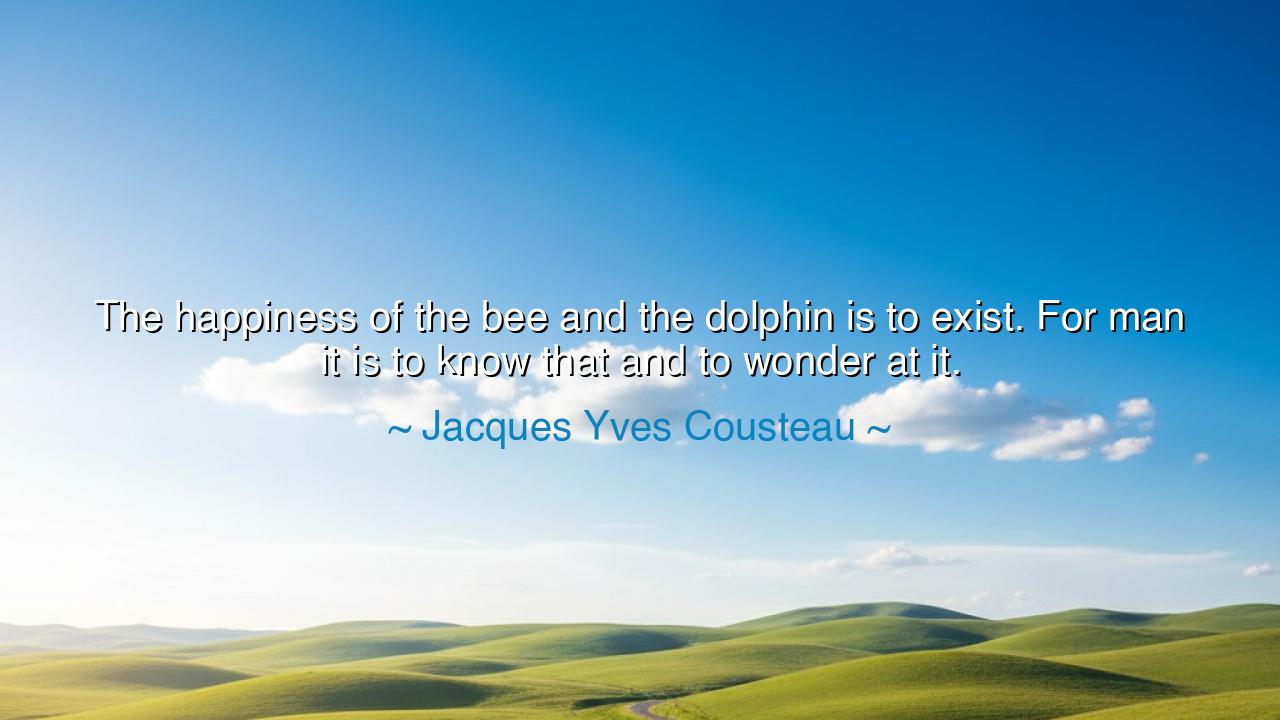
The happiness of the bee and the dolphin is to exist. For man it
The happiness of the bee and the dolphin is to exist. For man it is to know that and to wonder at it.






"The happiness of the bee and the dolphin is to exist. For man it is to know that and to wonder at it." — Jacques Yves Cousteau
Thus spoke Jacques Yves Cousteau, the explorer of the blue depths, the poet of the sea, whose heart heard the silent hymns of the oceans. In this sentence, soft as a ripple yet deep as the abyss, he reveals the great divide between humanity and the rest of creation — and also the bridge that joins them. The bee gathers honey, the dolphin dances in the tide; their joy lies not in ambition, nor in reflection, but simply in being. They live in perfect harmony with the rhythm of life. But man, burdened with awareness, is not content merely to exist. His happiness, Cousteau tells us, lies in knowing that these creatures exist — in wondering, in feeling awe before the beauty of being itself. For to be human is to seek meaning in the miracle of life, and to feel joy not only in living, but in understanding life’s vast mystery.
The bee and the dolphin are pure expressions of nature’s will. They act without doubt, they move without hesitation, they are never divided within themselves. The bee’s labor and the dolphin’s play are both perfect, each act complete in itself. They ask for nothing beyond the moment. But man — the thinker, the dreamer — is gifted and cursed with consciousness. He cannot simply live; he must ask why. In his heart burns both curiosity and longing, and from that fire come both his suffering and his greatness. The animals are content; man is restless. And yet, it is precisely this restlessness — this ability to wonder — that forms the essence of human joy.
Cousteau, who spent his life beneath the waves, saw this truth reflected in the world he loved. As he watched dolphins gliding through shafts of sunlight and coral swaying in quiet waters, he felt a reverence deeper than happiness — the sacred wonder of existence. He knew that the creatures of the sea lived as they were meant to, without envy or sorrow, untouched by the fever of thought. But his own joy, the joy of humanity, came not from sharing their simplicity, but from beholding it, from realizing that such perfect harmony exists at all. Man’s blessing, and his burden, is that he can look upon the world and say, “It is beautiful,” and then spend a lifetime asking why.
So too did the ancients understand this divine tension. Aristotle called man “the animal that wonders,” for it is wonder that gives birth to knowledge, and knowledge that gives birth to virtue. The philosopher looks upon the stars and marvels that they shine; the child watches an ant carry its burden and feels astonishment; the poet hears the wind through trees and feels a kinship with eternity. In each of these, there is the echo of Cousteau’s truth — that the highest happiness of humankind is not in possession, but in perception. We are most alive not when we have conquered the world, but when we pause to marvel that the world exists at all.
Consider the life of Albert Einstein, who once said, “He who can no longer pause to wonder and stand rapt in awe is as good as dead.” Though he mastered the language of the cosmos, Einstein never ceased to be astonished by it. He gazed into the mysteries of light and time and still felt, as a child might, the thrill of existence itself. His happiness was not in knowing all things, but in the wonder of knowing that there is always more to know. In him lived Cousteau’s wisdom — that the joy of the human heart lies not in control, but in reverence.
And yet, how often do we forget this sacred duty of wonder? We rush through our days, blinded by utility, deaf to the quiet symphony of creation. We pass the flower without seeing its color, hear the bird without listening to its song. The bee and the dolphin do not forget their joy — they live it with every breath. But we, in our hurry, lose the very thing that makes us human: our capacity to stand still and marvel. To live rightly, then, is to recover this sense of awe — to look upon the world as if seeing it for the first time, and to know that it is good simply because it exists.
So, my child of the living world, let this be your lesson: live with wonder. When you wake, give thanks that the sun has risen. When you walk, notice the wind’s caress, the murmuring of leaves, the rhythm of your own heartbeat. Know that you are part of the same great song that the bee hums and the dolphin sings. But unlike them, you can know that it is a song — and that is your gift. Do not squander it. Let your happiness be not in possession or pleasure, but in the sacred astonishment of being alive. For to know existence, and to wonder at it, is to fulfill the highest purpose of man — to be both participant and witness in the miracle of life.






AAdministratorAdministrator
Welcome, honored guests. Please leave a comment, we will respond soon